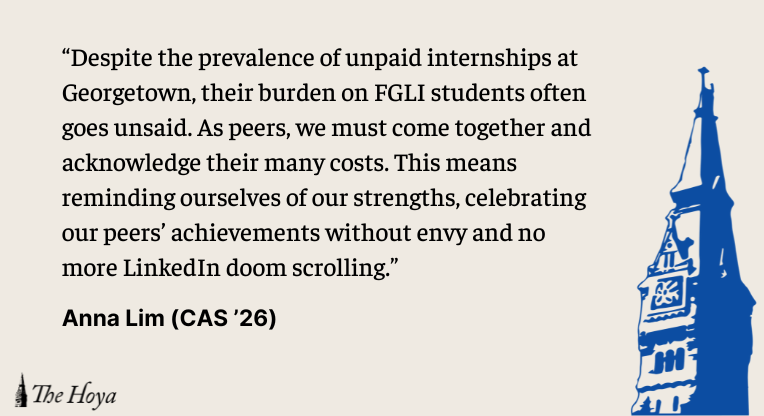Summer is not technically over yet, but your LinkedIn feed might indicate otherwise with its endless stream of:
I’m so grateful to announce that I have just completed my Civil Rights and Civil Liberties Internship in the U.S. Department of Homeland Security!
Everyone is wrapping up their impressive summer internships in impressive positions at impressive companies, and you… worked as a barista at your hometown Dunkin’ Donuts.
At elite universities, the intense pressure to secure internships has become an expectation and not just an aspiration for many students. Career advisers and deans constantly tout the numerous perks, which range from networking to resume-building to career discovery.
However, much like many other aspects of attending a prestigious university, the glorification of unpaid internships disproportionately impacts first-generation, low-income (FGLI) students, as the burdens associated with lost time and money are detrimental to students’ mental health.
FGLI students are already underrepresented in internship participation according to the National Association of Colleges and Employers (NACE). Only 19% of paid interns were first-generation students, despite making up 22% of the sample population of the NACE survey. This gross underrepresentation of FGLI students in internship participation means that these students’ chances at upward social mobility are diminished.
Even if FGLI students do acquire an unpaid internship, there is a massive cost associated with accepting it. Students who take on unpaid internships are missing out on tangible pay, in exchange for the “value of experience.”
Therefore, FGLI students, who often already belong to marginalized, low-income communities, are by definition less likely to have the disposable income required to finance an unpaid internship.
The burden of unpaid internships becomes even greater considering the cost of living in cities that offer the most high profile internships. Washington D.C., New York City and Los Angeles, for example, are home to several of the most dominant internship industries, including public policy, investment banking, consulting and technology. Each of those cities is ranked in the top seven of cities with the highest costs of living.
This underlying cost removes many FGLI students from the pool of applicants for unpaid, yet professionally valuable, internships in expensive cities.
Not only does this financial burden limit the opportunity to participate in internships, but it also blocks FGLI students from learning the unspoken language of wealth and connections that affluent students at elite schools, like Georgetown University, tend to already know.
Soft skills and professional etiquette are not taught in class. In addition, FGLI students generally do not have parents who can advise them on the internship intangibles — from sending post-interview thank you emails to reaching out for networking purposes.
Although career centers try to bridge this gap, university-sponsored mentorships and career counseling are “often not enough to level the playing field,” per a 2019 Georgetown Feed article. For FGLI students, working is often seen as a means of survival; however, for the wealthy, summer internships are viewed as another opportunity to advance up the career ladder.
In particular, communities of color have been historically excluded from wealth culture, higher education and the professional world; unpaid internships continue to perpetuate these glaring racial inequities. Unpaid internships especially benefit those who can already afford them — and they are often nonwhite. As a result, affluent students have an easier pathway to the connections and career skills that can be obtained through an unpaid internship.
According to a 2021 Lending Tree survey, 47% of unpaid interns took on debt to cover the financial gap that the job cost them. In addition, they found that unpaid Black and Latinx interns disproportionately took on more debt than their white peers did.
In order to avoid facing financial distress, students may simultaneously take on multiple jobs to offset the cost of living associated with unpaid internships — including transportation, housing, utilities and groceries. This, however, leaves them with less time for other opportunities, such as study abroad programs, summer classes and a paid job.
Students forced into this position are not afforded a break and are stuck in survival mode; they must make ends meet, while balancing a demanding internship. As a result, they are faced with the feeling of burnout. Knowing that you have to work even more than your wealthier peers, just to receive the same professional benefits, is demoralizing. This form of anxiety contributes to a capitalistic cycle of excessive stress, fatigue and immense pressure.
Recently, the White House has begun to offer some paid internships with stipends, an important step in reducing the inequities associated with unpaid internships. It is time that companies follow this lead and phase out unpaid internships in exchange for paid ones, as this would reduce the burden on FGLI students to choose between valuable experience and financial stability.
Despite the prevalence of unpaid internships at Georgetown, their burden on FGLI students often goes unsaid. As peers, we must come together and acknowledge their many costs. This means reminding ourselves of our strengths, celebrating our peers’ achievements without envy and no more LinkedIn doom scrolling.
Unpaid internships, as well as prestigious clubs and perfect grades, are not the answer to happiness. Perhaps the answer can be found in giving ourselves patience, the freedom to rest and the grace to explore unconventional forms of success.
Anna Lim is a sophomore in the College of Arts & Sciences.














